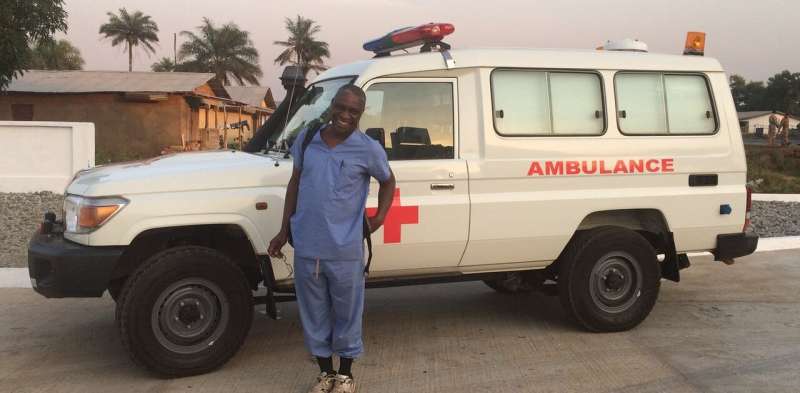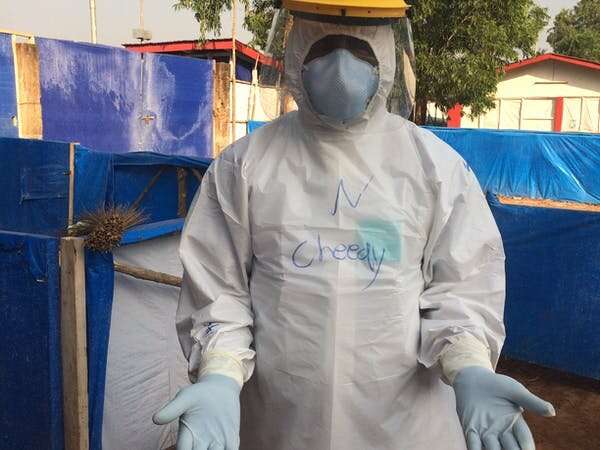I was a nurse on the front lines of Ebola, and I saw that nurses need support for the trauma and pain they experience

Since the beginning of the profession, nurses have played pivotal roles during outbreaks of disease, delivering care throughout even the bleakest of public health emergencies.
Here's my story: In 2014, the world was slowly recognizing that the Ebola outbreak in West Africa was monumental in scale and getting worse. More than 30,000 were infected, and 11,000 would die. Transmitted from person to person, the disease was mostly in Sierra Leone, Guinea and Liberia. As local health care systems struggled to respond to the large cases of infected patients, nurses from around the world came to help; I was among them. I am an associate professor of nursing at the University of South Carolina College of Nursing and a board certified psychiatry and mental health advance nurse practitioner.
When our team arrived in Sierra Leone in December, 2014, there were 450 cases being recorded weekly. The health care infrastructure had been devastated by a decade of civil war, and it lacked trained health care workers, medical supplies and hospital beds for the surging Ebola cases.
I was drawn to serve in Sierra Leone at the height of the epidemic because of the duty to care that we nurses believe is part of our profession. I felt a calling even though I had no idea what I could offer. But I would do whatever was asked of me.
Protective equipment that felt like body armor
I remember vividly the first day I donned my personal protective equipment (PPE) – hooded Tyvek bodysuit, N-95 face mask, boot, theater cap, three pairs of gloves, face shield and apron—to enter the Ebola isolation unit at Port Loko Hospital early Christmas Day 2014, only to encounter a young patient who had died overnight, lying on the cold concrete floor. The cacophony of emotions I felt—panic, fear and dread were palpable. I thought to myself, "God, I am no hero. Please get me out of here."
As my initial fears subsided, I put my clinical skills to work. For two months, our team worked round the clock providing palliative care and psychosocial support to patients with dwindling clinical resources, constantly evolving treatment protocols, in a frighteningly dire work environment.In that sense, Ebola was also a disease of the caregiver. As health care workers, we knew we were more likely to be infected with Ebola than adults in the general population. There was no vaccine.
A constant existential feeling of unsafety and heightened sense of doom enveloped the Ebola hospital. Yet each day, we went through the meticulous process of donning and doffing PPE to assess confirmed Ebola patients, perform physical exams, provide medication, keep them hydrated and cajole them to eat. We would repeat this process three to four times each 12 hours shift.
Performing these tasks required careful deliberation. PPE are difficult to walk and to bend in. With daily temperature in the region reaching 100 degrees Fahrenheit, we were instantly drenched with our sweat. Our goggles fogged up, hampering visibility; double gloving interfered with our dexterity, and our hoods made use of stethoscope impossible. Patient assessment was sub-par and care was limited. Our patients could not see our faces, limiting ability to show empathy and establish human connections. We were terrified about safety, about getting infected. But no one saw our fear; it was our job to conceal it.
And on we worked. It was only years later that I realized the toll that the Ebola epidemic had taken on me. At the peak of the epidemic, we had an average census of 70 confirmed cases daily. Ebola was ruthless on children. For every 10 infected kids under 12 months of age, nine died. For every 10 kids under five years, seven were likely to die.
A look back, in wonder
In retrospect, I wondered: Was I truly prepared for the mental pressure and anguish health care workers faced in an epidemic? While cognizant of the "duty to care," was I oblivious to the "duty to self-care"?

Nurses have an ethical obligation to care for themselves. If nurses don't take care of themselves, how will they be able to care for others? I did not ask the crucial question before heading to Sierra Leone: Did I have the appropriate "nursing preparedness" required in a disease epidemic?
I did not ask this question because I did not anticipate how the media hysteria over Ebola would affect my mental well-being. I did not anticipate the stigma, simmering anger and deep sense of betrayal surrounding monitoring and quarantining of returning volunteer health care workers from West Africa. I did not anticipate the psychological trauma, confusion, anger and sadness I would experience during state-mandated isolation.
As hospitals across the U.S. have ramped up diagnostic and treatment capacity for the coronavirus pandemic, it is imperative that our society also focuses on nurses' preparedness. During disease outbreaks, nurses' levels of preparedness and experience help them decide adroitly how much care they can provide to patients while also taking care of themselves. Nursing preparedness is a set of skills, abilities and knowledge that enables nurses to respond and prepare for varying public health emergency roles.
Preparedness training is supposedly integrated into nursing curriculum with a focus on principles of disaster management. However, studies have shown that nurses remain inadequately prepared to respond to infectious disease outbreaks. Lack of a formal institutional preparedness plan may result in delays in initiation of treatment by nurses.
The misdiagnosis of the first Ebola patient in a hospital in Dallas, Texas in 2014, combined with two nurses contracting the disease while caring for the patient, is a classic example of lack of institutional preparedness in responding to a novel disease.
Education and training are critical to preparedness during disease outbreaks. Evidence‐based recommendations to enhance nurses' preparedness include opportunities to engage in emergency preparedness planning, mock drills and actual events when possible to increase competence in disaster management, confidence in abilities, and familiarity with disaster preparedness protocols.
Given the increase in prevalence in recent years of natural and human-induced emergency events, it is imperative that nurses understand their roles in the planning, mitigation, response and management aspects of disease outbreaks at the community, national and global levels. Studies have shown that nurses feel ill-prepared to respond effectively to disease epidemic and disaster situations.
Institutional support
During an epidemic, nurses are likely to acquire new roles and perform unaccustomed tasks, often extending themselves beyond their expertise, scope and comfort level. Nurses could encounter unanticipated challenges like a shortage of needed resources, such as personal protective equipment, infection control material resource and inadequate facilities that could adversely hamper the quality of health care service delivery.
This was our reality fighting Ebola in Sierra Leone. To prevent the same thing happening here, local hospitals and health care centers should include nurses in resource triaging to ensure accurate identification of front-line priorities in maintaining core nursing services.
Nurse should not work in uncertain, unsafe and morally distressing conditions with limited resources. The adverse consequences on nurses' short- and long-term mental health could be significant. Establishing a supportive atmosphere at the front-line is of paramount importance. Specific interventions to promote psychological well-being should be implemented as part of ongoing support from health care institutions.
Nurses more than any other health care workers, constitute the major taskforce in responding to the disease outbreaks. For their sake and society, they need institutional support to ensure that they are trained, well prepare and ready to step into an epidemic response role.
This article is republished from The Conversation under a Creative Commons license. Read the original article.![]()

















